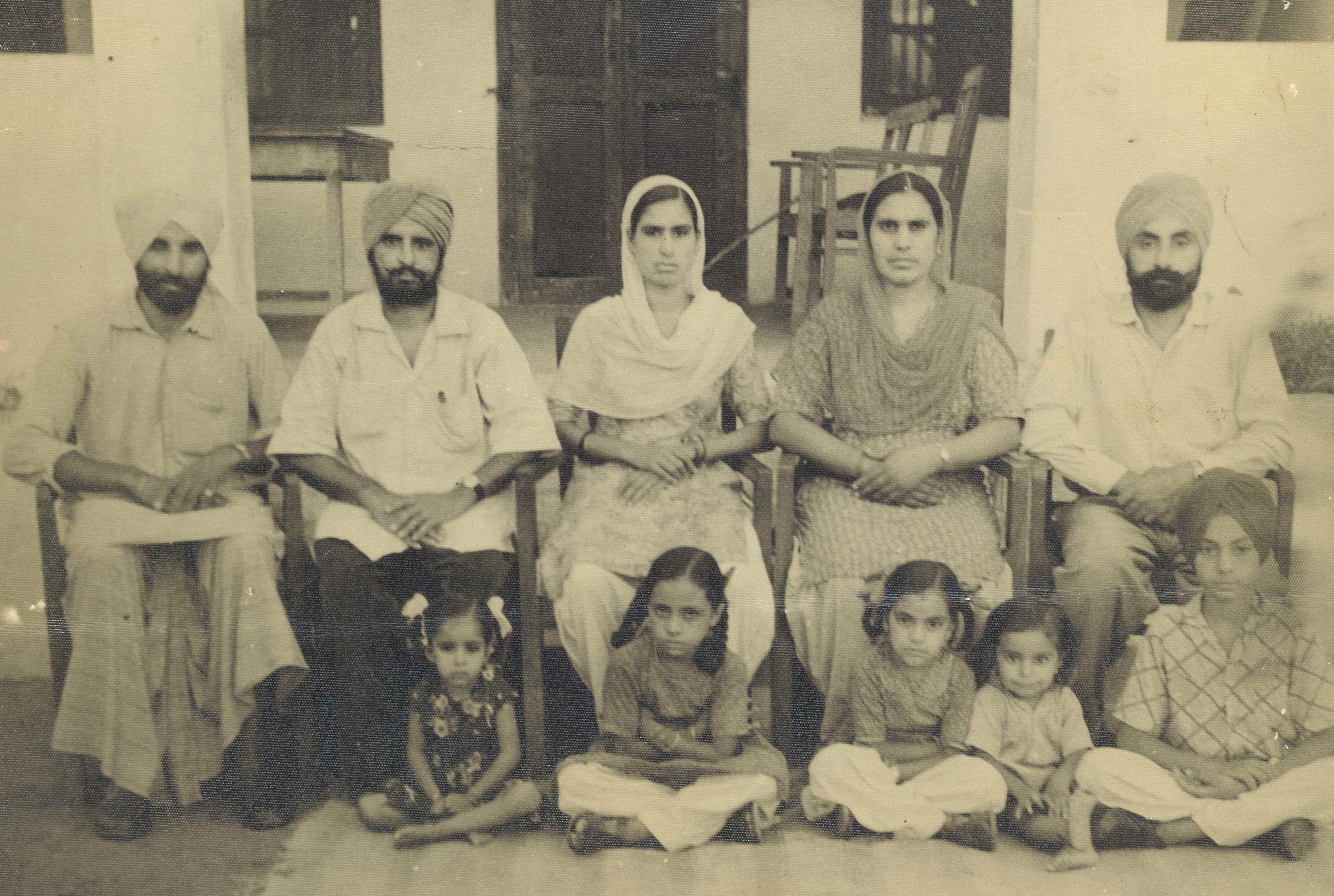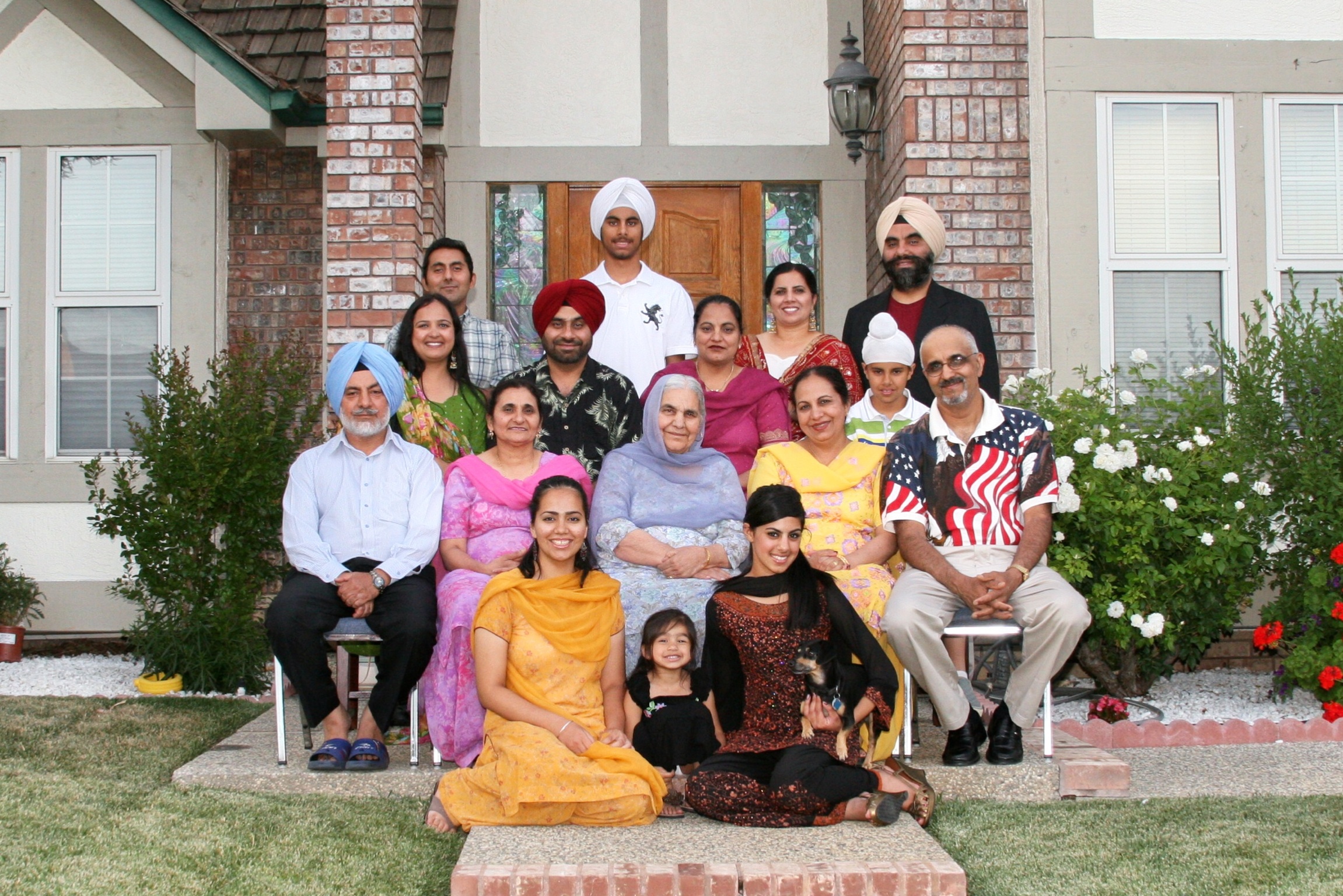Charan Kaur Kang
Charan Kaur Kang (born August 1, 1929) was raised in a Sikh farming family in the Lyallpur area of west Punjab that later became a part of Pakistan in 1947. She fondly remembers the peaceful life growing up in the small village of Shabi (26) Chak playing games and performing housework. “We all lived harmoniously,” she recalled. She emphasized the close friendships between Sikhs, Muslims, and Hindus who enjoyed attending each other’s festivals.

Charan (seated second from right) with family, 1964, Punjab, India.
However, education was very limited for rural families in Punjab during the 1930s when she was growing up. It was highly unusual for girls to obtain education beyond a few years. In Charan Kang’s memory, “I really wanted to [study], but my family wanted me to do housework. They wanted me to take care of my younger siblings.” She did not receive any formal education. Families felt it was more important to prepare young girls for marriage rather than education. Charan says she wished she had become educated: “I dreamed of getting an education often. I still do now. When my kids tell me how to do something, I think to myself, ‘Had I been educated, I would have been able to do this.’ This thought stays in my heart.” After a long pause, she added, looking upwards: “Who knows what heights I would have reached [if I was educated.]”
Charan is also a survivor of India’s 1947 partition, the largest mass human migration in history. When she was just eighteen years old, she survived a harrowing journey to India. In the months leading up to partition, she witnessed escalating communal violence: “We were constantly in fear of being murdered.” Given her family’s deep friendships with local Muslims, they thought they would remain in their village up until the night they left fleeing for their lives. “My family didn’t bring anything,” she recalled. “We left with what we had on…. It was a very desperate time.” In one of the most comprehensive partition accounts, Charan shared every step along her journey reliving the traumatic experience. During the months that followed, she lost ten relatives to communal violence. She and the other girls from her village were prepared to fight for their lives and their honor: “We had very sharp spears that we were ready to use. We were not going to die without resistance.” She adds: “My heart begins shaking when I recall these memories and talk about them.”
“I dreamed of getting an education often. I still do now. When my kids tell me how to do something, I think to myself, ‘Had I been educated, I would have been able to do this.’ This thought stays in my heart.”

Kang family, Yuba City, 2006.
One of the painful aspects of partition was the finality of her separation from her home at such a young age. She has never returned to her place of birth. “I want to see my pind [village]. It’s where we were born and raised. I want to see what it looks like today.” She also longs to be reunited with her best friend, Fatima, who remained in Pakistan.
Despite the enormous challenges of starting their lives over again as refugees in India after partition, she married Dr. Harcharan Singh Kang in 1949. The family eventually settled in Patiala where her husband was a veterinarian. They raised five successful children, including three boys (Raghubir, Jasbir, and Jasjeet) and two girls (Harjit and Rajinder).
In 1994, Charan joined her children in Yuba City. She feels content living in the United States: “Every wish of mine has been fulfilled. May Waheguru keep all of you happy. I salute America.” Despite the tremendous challenges and hardships she faced in life, she believes in chardi kalaa — the spirit of optimism for her family and the Sikh community in America.
Photos courtesy of the Kang family.
Source: Interview with Charan Kaur Kang by Nicole Ranganath and Jasbir Singh Kang, Yuba City, December 18, 2017 with written input by her family.
